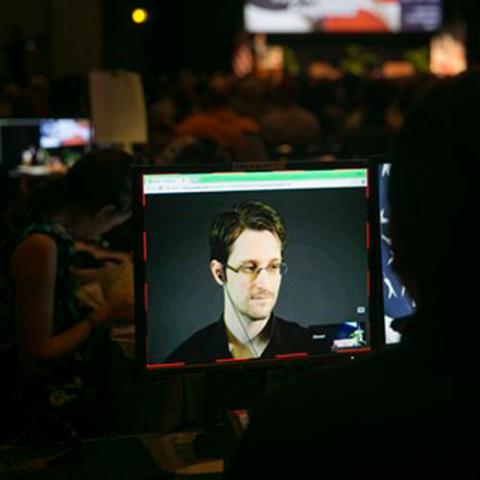- Net Neutrality Takes Effect Friday; ISPs Scramble to Avoid Complaints – Jon Brodkin (Ars Technica)
- CNN’s ‘Courageous’ Advertorial Mill – Jim Naureckas (Fairness and Accuracy in Reporting)
- White House Race has Already Sparked $1 Million in Negative Ads – Michael Beckel (Center for Public Integrity)
- Reporters Announce Conference in Louisville to Unionize Digital Media – Peter Sterne (Capital)
- How A Nieman Fellow Is Using Flash Drives—Yes, Flash Drives—To Change Cuban Media – Sarah Kessler (Fast Company)
- Life after Snowden: Journalists’ New Moral Responsibility – Alan Rusbridger (Columbia Journalism Review)
Net Neutrality Takes Effect Friday; ISPs Scramble to Avoid Complaints
By Jon Brodkin
June 10, 2015
Ars Technica
The Federal Communications Commission's net neutrality rules take effect Friday this week, and they've already had a noticeable impact on the behavior of Internet service providers.
The FCC passed the rules on February 26, but they didn't get published in the Federal Register until April 13. The publication date started the 60-day waiting period until the rules take effect, and it has been a busy two months.
The latest news occurred today when AT&T and network operator Cogent announced a new interconnection agreement for exchanging Internet traffic. If AT&T Internet users were experiencing trouble reaching websites, this could resolve that problem for any Internet traffic traveling from Cogent to AT&T.
CNN’s ‘Courageous’ Advertorial Mill
By Jim Naureckas
June 8, 2015
Fairness and Accuracy in Reporting
CNN has announced the formation of a new unit that will not report the news. Instead, it will take money from corporations to produce content that resembles news but is actually PR designed to burnish its clients’ images.
The name CNN gives to this mercenary enterprise? “Courageous.”
White House Race has Already Sparked $1 Million in Negative Ads
By Michael Beckel
June 11, 2015
Center for Public Integrity
The 2016 presidential election has already unleashed more than $1 million in negative ads, according to a Center for Public Integrity review of federal campaign finance filings.
To date, nearly all of the negativity has been directed at Democratic Party frontrunner Hillary Clinton, who announced her candidacy in mid-April.
This month alone, Clinton has been attacked by the Republican National Committee and a host of other conservative groups, including the Stop Hillary PAC and the Citizens United Super PAC.
“Getting in early was the only way to go given the enormity of the opposition,” said Dan Backer, treasurer of the Stop Hillary PAC.
Reporters Announce Conference in Louisville to Unionize Digital Media
By Peter Sterne
June 8, 2015
Capital
A group of reporters associated with the labor movement are organizing a conference in Louisville to discuss how to unionize the digital media industry.
The National Convergence to Organize Digital Media will be held in Louisville, Ky. on Oct. 8–11. It's being held in Louisville in honor of two mid-century Louisville Courier-Journal reporters who supported unionization and were victims of McCarthyism.
The organizers of the conference are hoping to build on the decision last week by Gawker Media's editorial staff to join the Writers Guild of America, East by bringing together reporters from different media companies and holding workshops about unionizing.
How A Nieman Fellow Is Using Flash Drives—Yes, Flash Drives—To Change Cuban Media
By Sarah Kessler
May 22, 2015
Fast Company
Elaine Diaz has spent the last several months studying at Harvard as a Nieman Fellow. She is the first of 1,400 winners in the 77-year-old program who is from Cuba, and she plans to launch a publication called Periodismo de Barrio when she returns to the country in June. The publication will focus on natural disasters, a topic that impacts many people in Cuba, which is about the size of Tennessee but has, by NOAA's count, been hit by one-third as many tropical cyclones as the entire United States and, by GDP, many fewer resources to support citizens in their aftermath.
What is most unusual about her project, however, is its distribution strategy. Periodismo de Barrio will publish online, but it will also attempt to reach Cubans in a way they more commonly consume media: an offline version of the Internet called the "weekly packet." Loaded with content like recent television shows, magazines, and games, enterprising small businesses distribute these "packets" on external hard drives that drop in price as the week goes on. If all goes as planned, Cubans will soon plug their drives into computers and televisions and discover Periodismo de Barrio.
Life after Snowden: Journalists’ New Moral Responsibility
By Alan Rusbridger
June 5, 2015
Columbia Journalism Review
The technologies first. Any journalist with even a cursory understanding of the Snowden stories published by The Guardian and The Washington Post would have come to an understanding that states—even liberal democracies—have the ability to intercept, store and analyse virtually all forms of electronic communication. Faceless people in shadowy agencies (not to mention the police) can, if they want, read your text messages and emails. They can see who or what you’ve been searching for. They can divine what you’re thinking. They can access all your contacts. And they can follow you.
Pre-Snowden, a knowledgeable minority would certainly have known about metadata. Post-Snowden, there’s no excuse for anyone in journalism (or the law, or medicine, or any profession involving confidentiality) not to know what metadata is. The agencies themselves have been quite open about the value of knowing the who-whom-where-when questions. Stewart Baker, the former general counsel of the NSA, said in a 2013 discussion hosted by The Guardian in New York: “Metadata absolutely tells you everything about somebody’s life. If you have enough metadata you don’t really need content… sort of embarrassing how predictable we are as human beings.“


Spread the word